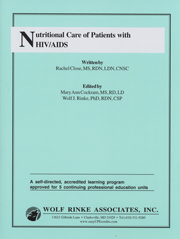|
|
|
||||||||||||||||||
|
List of All Activities
Share an Activity: Order Form |
|||||||||||||||||||
This CPE activity is designed to provide a medical overview of human immunodeficiency virus (HIV) and acquired immunodeficiency syndrome (AIDS) and specifics to consider to appropriately and effectively implement the Nutrition Care Process (NCP). People with HIV and AIDS are living longer and are requiring more specialized nutrition attention during their lifespan. Having qualified and up-to-date dietetic practitioners’ familiar with the intricacies of providing optimal, evidence-based nutritional care to this medically complex population from early diagnosis to the late stages of the disease process is essential. You will gain expertise in areas requiring your involvement during the HIV disease process including:
Meets licensure requirements for Florida and other states that require it. Share with a friend and Save! Click here for important information about
sharing.
Nutritional Care of Patients with HIV/AIDS © 2024 Wolf Rinke Associates. All rights reserved for this self-directed accredited learning activity. Reproduction in whole or part without written permission, except for brief excerpts, is prohibited. OBJECTIVES Upon completion of this accredited, self-directed learning program you should be able to:
ABOUT THE AUTHOR Rachel Close, MS, RDN, LDN, CNSC is a registered dietitian with a Bachelor of Science degree in dietetics from Syracuse University and a Master of Science degree in nutritional sciences from the University of Wisconsin-Madison after which she completed her clinically focused dietetic internship at the Brigham and Women’s Hospital. She has extensive experience in clinical nutrition and nutrition support. She is currently a team leader dietitian specialist specializing in critical care nutrition within the Nutrition Support Service, medical intensive care unit, and neurological/neurosurgical intensive care units at the Brigham and Women’s Hospital in Boston, Massachusetts. She also teaches medical nutrition therapy at the undergraduate level at the American University of Beirut in Beirut, Lebanon. If you prefer to order by phone, mail or fax click below Order Formor click here to contact us with other questions. For information about our other products and services return to the sidebar at the top of the page. |
|||||||||||||||||||

